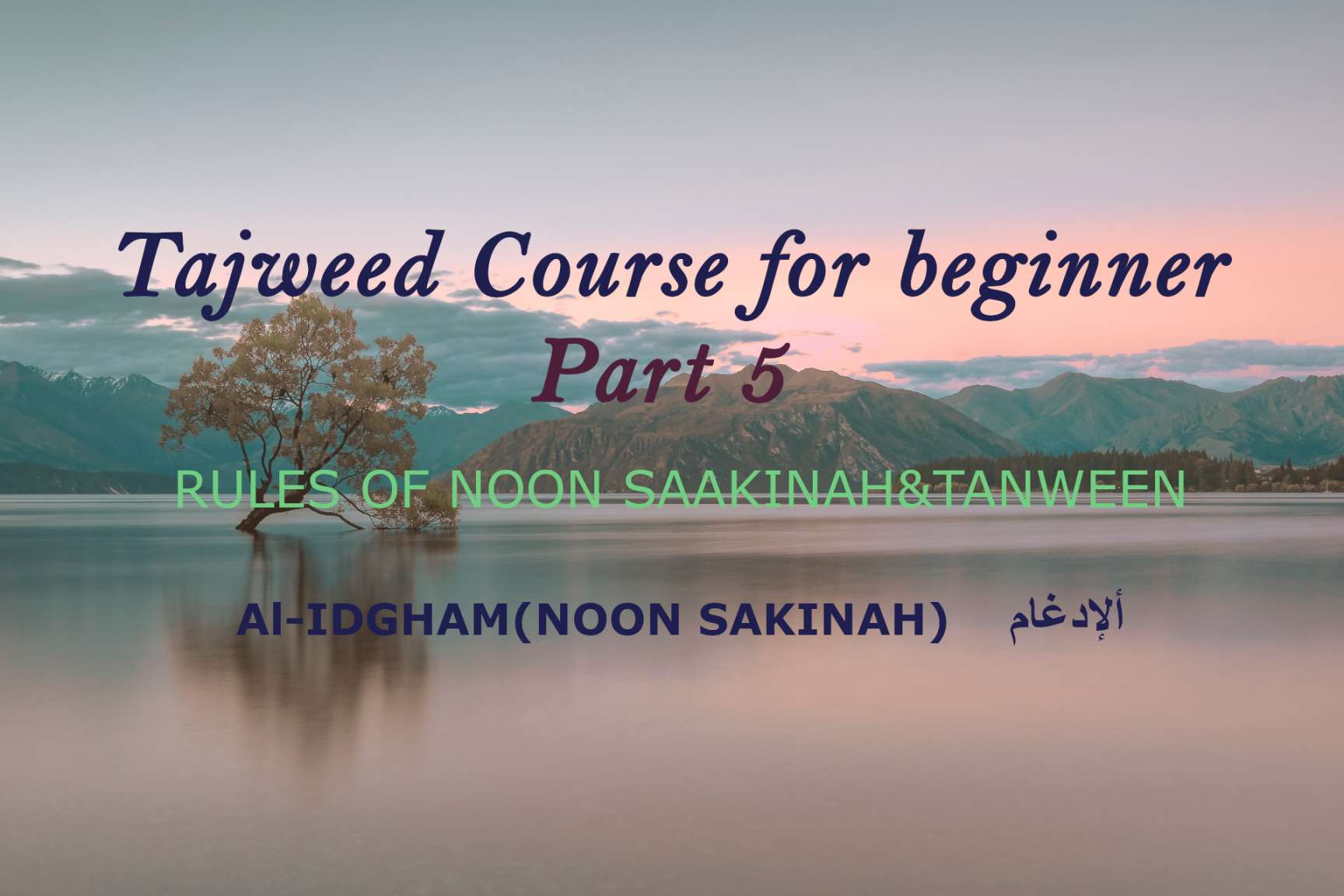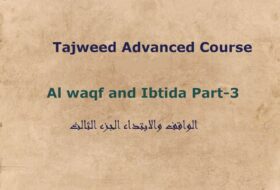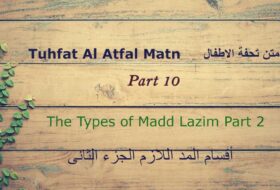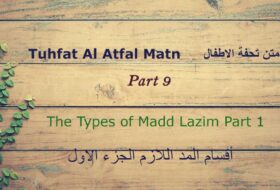Tajweed Course for beginner Part-5
Al-IDGHAM(NOON SAKINAH) الإدغام
Idghaam means the insertion or merging.
IDGHAM in Tajweed: The meeting of a non-voweled letter with a voweled letter so that the two letters become one emphasized letter of the second type.
Looking at the example:
- ( انْنَ ) will not be written as such.
The letter ( ْن ) accompanied with a sukun ( ْن ) is merged into the next letter ( َن ) which is accompanied with a fatha), so they will become one (i.e. as the second letter).
A shadda indicates that the merging has taken place so the word will be written as ( ًان )
Remember: The rule of idghaam is applied to nun sakin only.
Idghaam Letters:
There are six letters of Idghaam which are collected in the word يََََرََََمََََلََََوََََنَ ) ر م ل و ن ي )
Types of Idghaam:
1– Idghaam with Ghunnah م – ن – و – ى
2- Idghaam without Ghunnah ل – ر
Idghaam with Ghunnah م – ن – و – ى
During recitation, when nun sakin or tanween is followed by any letter from this group, then the nun sakin will be merged into the second letter and be pronounced with ghunna – the ghunna will be held for two counts.
- This is called half idghaam (idghaam with ghunna)
Example : ( مَن يٌَقُولُ ) will not be pronounced as ‘man yakulu’.
If we separate the letters, it would be مَن يْ يَ قُولُ
The nun sakin merges with the ya fatha and becomes the second letter. The word will be read as ‘may yakulu’ The ghunna will be held for two counts on the ‘y’.
- Practice reciting the following words holding the ghunna for 2 counts.

Idghaam without Ghunnah ل – ر
During recitation, when nun sakin or tanween is followed by any letter from this group, then the nun sakin will be totally omitted and the second letter will be pronounced with a shadda and without ghunna.
- This is called full idghaam (idghaam without ghunna)
Example : ( مِن رَّسُولٍ ) will not be pronounced as ‘min rasulin’.
If we separate the letters, it would be مِنْ رْ رَ سُولٍ
The nun sakin is omitted or cancelled completely and the letter that follows it, will be:
- Pronounced with a shadda and without ghunna…
- The word will be read as ‘mir rasulin ’.
- There will be no ghunna (nasal) sound.
Practice and recite the following words – with no ghunna (no nasal sound).

Note: the Noon Saakin or the Tanween and the Idgham letter have to be in two different words, otherwise the reader is not Supposed to do Idghaam. In this case it will be Izhaar Motlaq ( أظهار مطلق ) and this case can be found only in Four words in Quran صنوانَ ،َ قنوانَ ،َ بنٌيانَ،َ الدنٌيا
Tuhfat Al Atfal Matn (Noon Sakinah&theTanween) :
والثَّـانِ إِدْغَـامٌ بِسَتَّـــة أتـــَتْ فِي يَرْمُلـُونَ عِنـْدهُم قَدْ ثَبَتتْ
VOCABULARY:
والثَّـانِ – second the
إِدْغَـامٌ – idgham
بِسَتَّـــة – in six (letters)
أتـــَتْ – appear, take place, occur
فِي يَرْمُلـُونَ – This combination indicates to/holds all the letters of idgham
عِنـْدهُم – according to them (the qurraat)
قَدْ – verily , surely
ثَبَتتْ – established , Fixed
TRANSLATION:
9. And the second (rule) is idgham in six (letters), appearing in (combination the which are fixed by them (the qurrāʾ – as يَرْمُلـُونَ the letters of idgham)
COMMENTARY:
The second rule the author explains to us is idghām, which literally means to assimilate or to join one thing into another. In this case, the Noon Sakinah or Tanween will be assimilated into one of the of letters يَرْمُلـُونَ if they appear after the Noon Saakinah or Tanween .
He further adds that these six letters are affirmed amongst qurraʾ as the letters of idghām i.e. all the qurrāʾ agree that idgham of Noon Saakinah or Tanween .will take place into these six letters.
TEXT:
لَكنَّهَـا قِسْمــانِ قسْــمٌ يُدْغَمَــا فِيــِه بِغُنَّـةٍ بِيَنمُـو عُلِمَــا
VOCABULARY:
لَكنَّهَـا – but they (these six letters)
قِسْمــانِ – two types
ٌقسْــمٌ – part or type (one). The singular of قِسْمــانِ
يُدْغَمَــا – idghaam will be made
فِيــِه – in it (this type)
بِغُنَّـةٍ – ِwith ghunnah. Ghunnah is the nasal sound found in every Noon and Meem.
بِيَنمُـو – ِin (the letters of) يَنمُـو
عُلِمَــا – they (the letters) are known.
TRANSLATION:
10. But they (these six letters) are of two types: one, in which idghām takes place with ghunnah. It is known (remembered) by يَنمُـو
COMMENTARY:
The author divides the six letters of idgham into two types: those letters in which idghām takes place with ghunnah, and those letters in which idghaam takes place without ghunnah. In this line, he explains the first type: idghām with gunnah. Idghām will take place with ghunnah in the four letters of يَنمُـو if they appear after the Noon Saakinah or Tanween .
TEXT:
إِلا إذَا كَــانَا بِـكلْمَـةٍ فَـــــلا تـُـدْغِمْ كَـدُنْيَا ثُمَّ صِنْوَانٍ تَلا
VOCABULARY:
إِلا – except
إذَا – if
كَــانَا – the two of them. It refers to the mudgham which would be the Noon Sakina or the Tanween, and the mudgham fīh which would be one of the letters of يَنمُـو In some prints it appears as كان without the Alif at the end. In this case it would only refer to the mudgham (the Noon Sakina or the Tanween).
بِـكلْمَـةٍ – in one word. It may be read with a fatḥah or kasrah on the kaf. The meaning will remain the same.
فَـــــلا تـُـدْغِمْ – then don’t make idghām. It can be read with a fatḥah on the ghayn also تـُـدْغِمْ ;(its meaning would then be: then idghām won’t be made .
كَـ – like
دُنْيَا ثُمَّ صِنْوَانٍ – examples for no idgham
تَلا – to follow. It hints at other examples, which follow the same pattern.
TRANSLATION:
11. Except if the two (mudgham and mudgham fīh) appear in one word, then do not make idgham like (in the words) thenُ صِنْوَانٍ and (examples that) follow (suit).
COMMENTARY:
In the previous line it was stated that if Noon Sakina or the Tanween appear before any of the letters of يَنمُـو idghām would be made with ghunnah. However, in this line the author mentions that if the Noon Sakinah is followed by any one of these letters in one word, then idgham will not be made.
In other words, idgham of Noon Sakinah into any of the letters of يَنمُـو will only take place if they appear in two separate words; the Noon Sakinah at the end of a word and one of the letters of يَنمُـو at the beginning of the next. If they appear together in one word idghām will not take place.
This will only apply to the Noon Sakinah and not to the Tanween , due to a Tanween always appearing at the end of a word; therefore it is impossible that a Tanween is followed by one of the letters of يَنمُـو in one word.
The author explains that idghām will not be made but does not explain what application should be used in its absence. However, in Jamzari’s explanation of the Tuḥfah, he states that iṭḥ-haar will be made instead.
Put any question in comment
See our courses
THE MUDOOD (LENGTHENINGS) PART 2
Lam Sakinah rules definite article















Comments